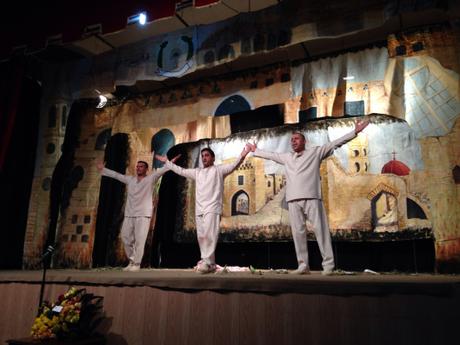
Olives are ubiquitous in the Middle East. Served with almost every meal, they vary in color and size, offering a pungent, salty taste. Eat them with bread and white cheese and you have a meal fit for royalty. The trees are everywhere – in gardens, along the sides of roads, and in churchyards. You cannot escape the olive branch.
For years, the olive branch has been a symbol of peace. In early August, on my first evening in Iraq, I saw the symbol of the olive branch in a new way.
We had been invited to participate in a women’s meeting in late afternoon, but immediately following the meeting we were whisked away to a performance put on by actors from the city of Qaraqosh. Exactly one year ago that day, Qaraqosh had fallen to the Islamic State. Until that time, I had only read stories about Qaraqosh in the news. Now, I was meeting real people with real and poignant stories.
One woman, a lab technician, was walking home from work, only to have a neighbor rush up to her and say “You must leave! ISIS is coming!” She was the primary caregiver for both a father and sister who were disabled. In her words, she became “very afraid.” The next morning, her neighborhood was deserted and she saw the ominous, black ISIS flags in the distance. By a miracle, she was able to secure bus space for her family, but had to leave everything else behind. When you are fleeing for your life, your priorities of what matters and what you should take change in an instant.
The play we were privileged to see was about the fall of Qaraqosh. The heartache and loss that people experienced as they had to leave their homes and community was palpable. Vivid color and music drew us in. The stage set alternated between dark and ominous, where ISIS soldiers took center stage, to a bright and vibrant background of churches and ancient city streets.
The play was in three acts with monologues by three main actors. It was all in Arabic, but like all good acting, it didn’t just rely on the spoken word.
There were many poignant parts of the play, but a couple parts stood out. During one scene, a beautiful little girl came skipping and dancing on stage. She symbolized the story of Christina, a little girl who was pulled by ISIS from the hands of her mother while she was fleeing the city. Of all the stories of Qaraqosh, this one was the most difficult and symbolized all the loss and pain of a community. As the main character reached for Christina, she was gone.
During another scene, one of the actors reminisced about Palm Sunday, a day when the whole city of Qaraqosh would wave olive branches as they remembered the coming of Christ to Jerusalem.
But it was the end of the play that left a defining imprint on my heart and soul. The three actors came out on stage, holding hands and raising them high. They practically shouted words of forgiveness and grace:
“Though the road may be long and filled with our blood, we will go back bearing olive branches.”
This play was not ending on a note of despair, but of hope. This play was a tribute to resilience, to perseverance, to faith, and to forgiveness.
Forgiveness is not easy. We give up our rights to hold on to wrong-doing, we give up our rights to be victims, we extend grace to the perpetrator. Sometimes forgiveness costs us everything we have, everything we can give. But there is no ambiguity in the Biblical call to forgive, there is no gray area, there is no “but what about…?”
“You have heard that it was said, ‘You shall love your neighbor and hate your enemy’…But I tell you, love your enemies and pray for those who persecute you,”*
The command is clear, and I was witnessing a group that didn’t just act this out, but lived this out.
The actors on stage and the people in the audience were witnesses to a greater love, to a greater command then our human desire for vengeance and revenge. When they left Qaraqosh, they lost everything but their lives. Yet here they were, publically proclaiming grace and forgiveness.
Their grace and forgiveness was as present and pungent as olives and olive trees in the Middle East.
I have seen a lot of examples in my life of forgiveness, but this one was the most powerful.
I fell asleep that night with my heart full, the images of olive branches waving above me, images of forgiveness and peace.
*Matthew 5:44

